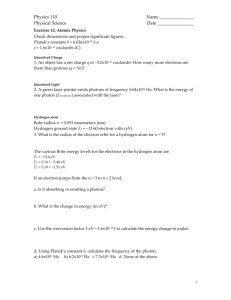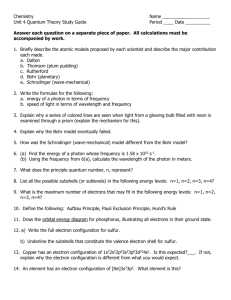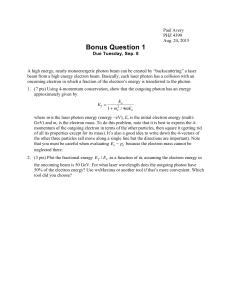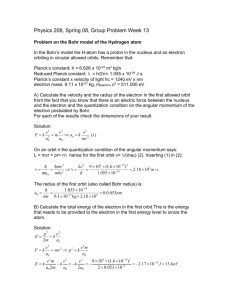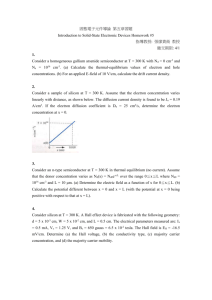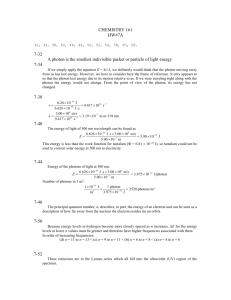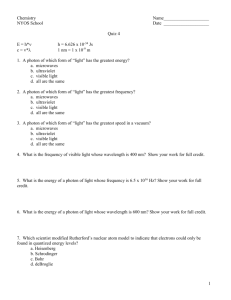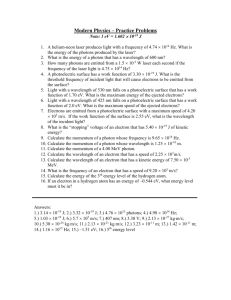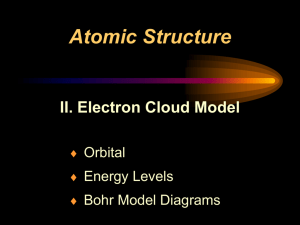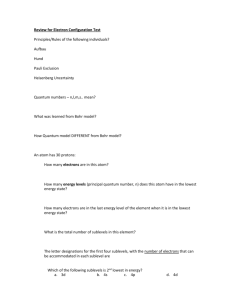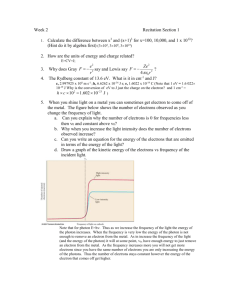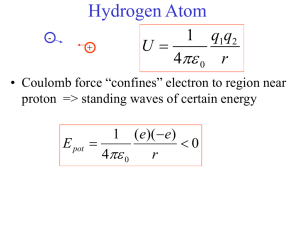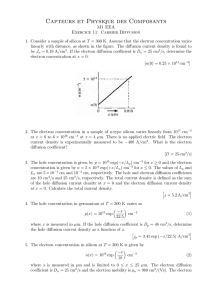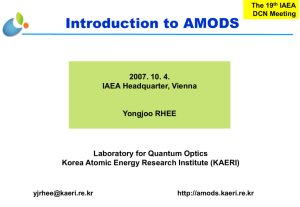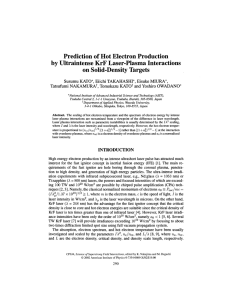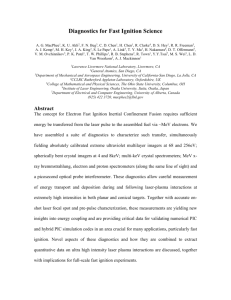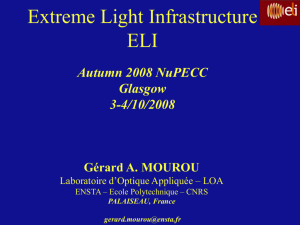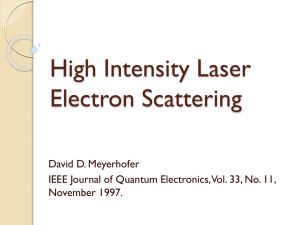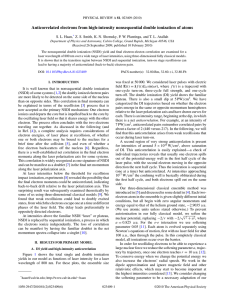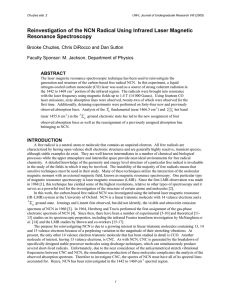Atomic units
advertisement
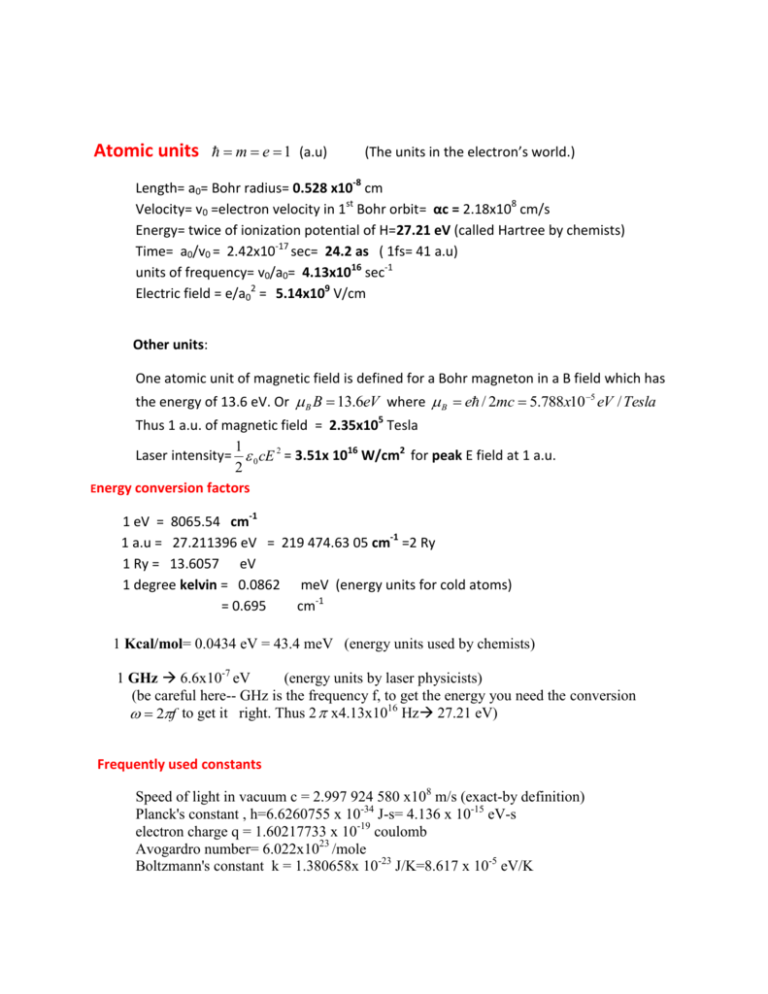
Atomic units m e 1 (a.u) (The units in the electron’s world.) Length= a0= Bohr radius= 0.528 x10-8 cm Velocity= v0 =electron velocity in 1st Bohr orbit= αc = 2.18x108 cm/s Energy= twice of ionization potential of H=27.21 eV (called Hartree by chemists) Time= a0/v0 = 2.42x10-17 sec= 24.2 as ( 1fs= 41 a.u) units of frequency= v0/a0= 4.13x1016 sec-1 Electric field = e/a02 = 5.14x109 V/cm Other units: One atomic unit of magnetic field is defined for a Bohr magneton in a B field which has the energy of 13.6 eV. Or B B 13.6eV where B e / 2mc 5.788x10 5 eV / Tesla Thus 1 a.u. of magnetic field = 2.35x105 Tesla 1 Laser intensity= 0 cE 2 = 3.51x 1016 W/cm2 for peak E field at 1 a.u. 2 Energy conversion factors 1 eV = 8065.54 cm-1 1 a.u = 27.211396 eV = 219 474.63 05 cm-1 =2 Ry 1 Ry = 13.6057 eV 1 degree kelvin = 0.0862 meV (energy units for cold atoms) = 0.695 cm-1 1 Kcal/mol= 0.0434 eV = 43.4 meV (energy units used by chemists) 1 GHz 6.6x10-7 eV (energy units by laser physicists) (be careful here-- GHz is the frequency f, to get the energy you need the conversion 2f to get it right. Thus 2 x4.13x1016 Hz 27.21 eV) Frequently used constants Speed of light in vacuum c = 2.997 924 580 x108 m/s (exact-by definition) Planck's constant , h=6.6260755 x 10-34 J-s= 4.136 x 10-15 eV-s electron charge q = 1.60217733 x 10-19 coulomb Avogardro number= 6.022x1023 /mole Boltzmann's constant k = 1.380658x 10-23 J/K=8.617 x 10-5 eV/K Short-hand notations. 109=giga, 1012 =tera; 1015= peta ; 1018 =exa ; 1021=zetta ; 1024=yocto 10-9=nano 10-12 =pico; 10-15=femto; 10-18=atto; 10-21=zepto; 10-24=yotta Notable wavelengths, frequencies and energies photon wavelength to ionize H: 911 oA Lymann- of H: 1216 oA 10.2 eV photon momentum (a.u.) or 1 nm 1.24 keV k= 2.7 x10-4 E (eV) de Broglie wavelength for electron, 100 eV is 1.22 angstrom Lasers For 1 oA, photon energy= 455.71 au for 800 nm -> 0.057au laser peak intensity (linear polarized) = 3.5 x1016 W/cm2 UP= E2/4 2 =9.33 I(1014 W/cm2) 2 (in m) ( 6eV for 800 nm at 1014 W/cm2) Keldysh parameter I /( 2U P ) time-frequency width relation for a chirped pulse: Gaussian pulse I () e 2 ( 0 )2 /( 4 ln 2 ) E (t ) e 2 ln 2t 2 / 2 ( is FWHM in time domain) width in eV for a Gaussian pulse for τ= 1 fs is 1.83 eV. 4 ln 2 x 1 2 1.5. Oscillator strength and transition rates A= 2*(ω2/c3) f (4.13 x1016) 1/sec where ω is in a.u. , c=137.03604 and f is the oscillator strength for emission
